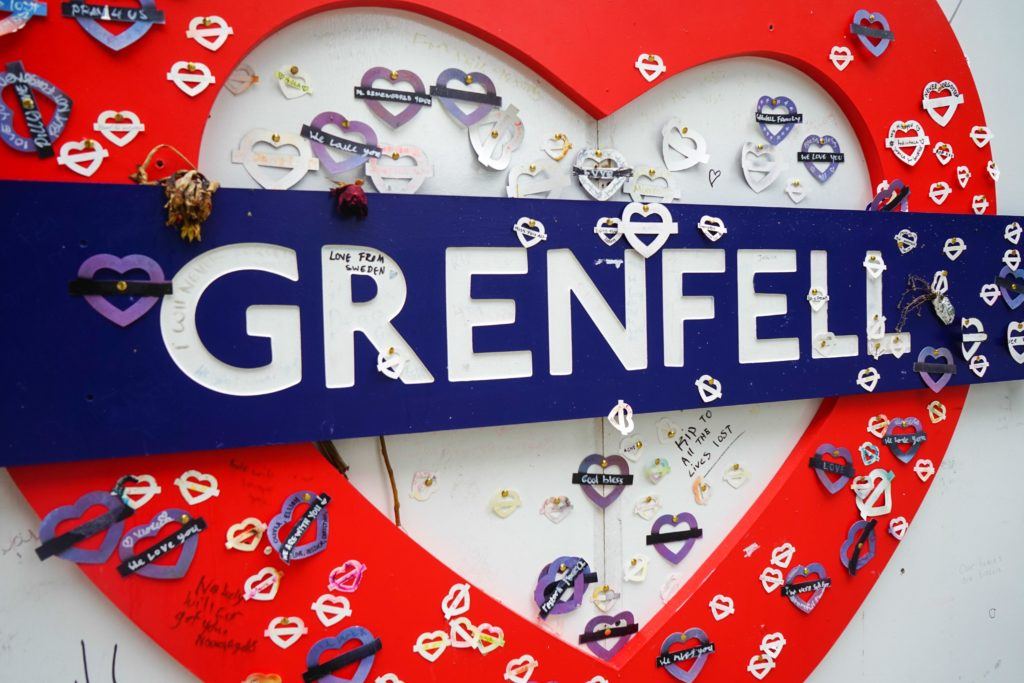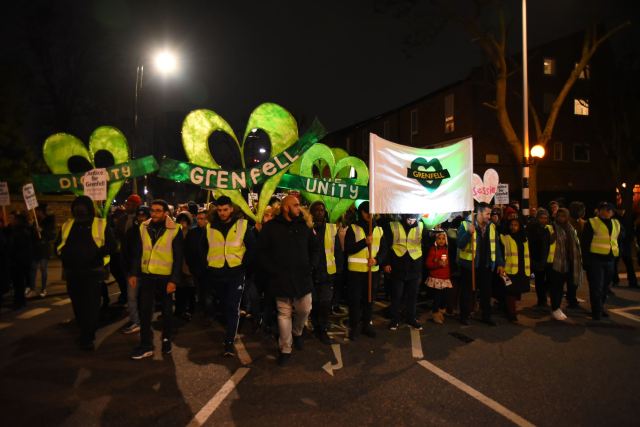Credit: Alberto Pezzali/NurPhoto via Getty Images

People walk silently, some quietly holding placards, faces serious and taut. Occasionally an arm stretches around a neighbour’s shoulder. A few tears are shed. A line of firefighters stand to attention, helmets at their feet while the crowd shuffles past. The predominant colour is green. Every now and again the march comes to a halt as a road is crossed, or an ambulance rushes past, and slowly, the thousands of people wend their way to the base of Grenfell Tower.
On the 14th day of every month since last June, a remarkable event has taken place around the streets of North Kensington. The Grenfell Silent March was the idea, among others, of a young man called Zeyad Cred.
I met Zeyad for the first time a few days after fire destroyed the tower block, when he was one of a group of local people hastily brought together to meet with the Prime Minister so she could hear the concerns of the immediate community around Grenfell.
I remember him then as articulate and thoughtful, with a controlled anger that occasionally broke out into passionate speech. Today, he and a group of others solemnly and expertly marshal the crowd in hi-vis jackets as it wends its way around the streets, stopping for a minute’s silence to view the ruins of Grenfell Tower, before a few short speeches are made and the crowd disperses.
Lament has long been one of the human race’s primary ways of dealing with tragedy, from the book of Psalms onwards. Lament can be loud and wailing, or it can be silent and noble. In the face of deep suffering, words often fail us, so silence is often the most appropriate response. Lament protests against the way things are but hopes for things to be different. It takes seriously the pain and distress of what has happened, but refuses to despair, or be crushed by it.
Here, people gather to remember the dead, the 72 who lost their lives as a result of the fire, and wordlessly ask for resolution, for answers. The Grenfell Silent March is an act of lament – a quiet act of memory, grief and protest that is more eloquent than many words. It is dignified, patient and determined.
None of the survivors and bereaved of Grenfell Tower asked to become public figures. Most were quietly living their lives until they were thrust into the maelstrom. Slowly, groups such as Grenfell United have organised themselves, drawn up constitutions, elected chairs and learnt to make their case. As they have met with Council Leaders, the media, celebrities, MPs, even the Prime Minister herself, one word comes through again and again: dignity.
Yes, there have been the shrill voices of angry protest, but these have most often come from outside the community, using Grenfell to make a political point. The people most closely involved have instead shown a determined restraint – through the memorial service at St Paul’s Cathedral in December, through each silent march. That approach is beginning to pay off.

The Government and Royal Borough of Kensington and Chelsea made a commitment that decisions on the future of Grenfell Tower site would not be made by the great and the good, but by the local community. A petition to request the appointment of new members to the Public Inquiry panel gained over 150,000 signatures, triggering a debate in parliament, and, in advance of that debate, a commitment by Prime Minister Theresa May to appoint two extra members – members who will hopefully add to its diversity and ability to win the confidence of local people. Most remarkably, the Public Inquiry is hearing personal testimonies from people telling their stories of the fire – something no Public Inquiry has done before.
These are small signs of momentum that give some hope. And they are the result of quiet, dignified, respectful protest and lament, not furious violence or shrill slogans.
Gracious, sorrowful lament is one of the most powerful ways of responding to suffering and resisting injustice in our world, as shown by Mahatma Gandhi and Martin Luther King. Dignified, patient determination was what brought change in their struggles and is what is slowly bringing change after Grenfell too. The loudest voices don’t always win.










Join the discussion
Join like minded readers that support our journalism by becoming a paid subscriber
To join the discussion in the comments, become a paid subscriber.
Join like minded readers that support our journalism, read unlimited articles and enjoy other subscriber-only benefits.
Subscribe